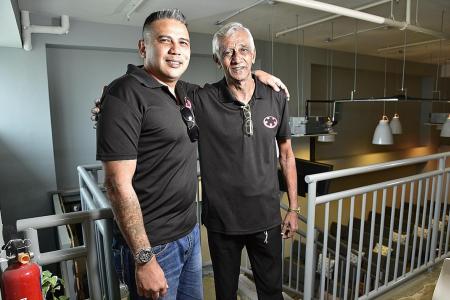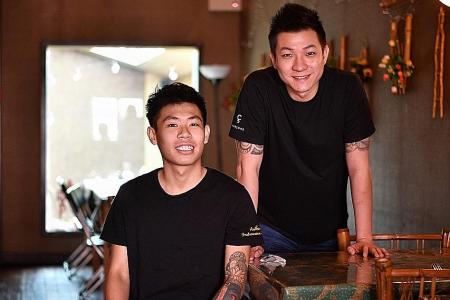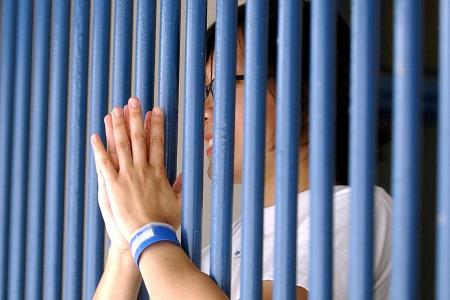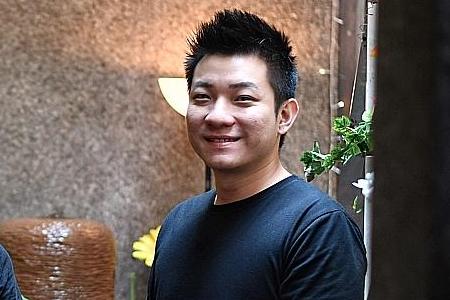Ex-offenders giving themselves and others a second chance
Singapore has managed to keep the recidivism rates of ex-offenders low. TNP speaks to ex-offenders on challenges they face on starting life anew
Circle of Brothers wants to change one life at a time.
Started around two years ago, it is a group of 12 ex-offenders, counsellors and youth pastors who want to help delinquent boys get back on track.
One ex-offender, Mr Kingsley Morrando, 47, knows how it is to not have a role model.
He recounted how, when he was four, he saw his father fall off the bed and die after a massive heart attack.
An only child, he told The New Paper: "He died in front of me. Naturally, I lacked the guidance of a father and role model after his death."
With his mother at work, Mr Morrando stole books and toys in primary school. He smoked and sniffed glue and became a rebellious child with his friends.
"It started by wanting to make a name for myself. I also believe it had to do with the 'live fast, die young' culture of my generation. Having a sense of belonging and wanting to emulate what was seen on the big screen brought us together," he said.
Everyone makes mistakes and it is those who learn from their mistakes that are eventually going to make a difference. Some mistakes, there is no coming back from.Mr Kingsley Morrando
At 16, he was arrested for armed robbery and put on probation. Two years later, his mother died in hospital after a fall in the kitchen.
Mr Morrando said: "I became angry at the world. I had no consideration for anything or anyone, including myself. Life spiralled out of control with alcohol and drugs. I was suicidal."
Busted for drug use when he was 21 and sent to a drug rehabilitation centre, Mr Morrando was released on police supervision at age 23.
But he fled the country on a chartered plane and spent 15 years in Canada as an illegal immigrant. He was sent back to Singapore at age 38 and charged with not obtaining a valid exit permit.
Out of cash, and with no family and friends, Mr Morrando looked to God instead.
He said: "Seeing how God has preserved my life gave me a new perspective. I know God has been patient and kind towards me on numerous occasions. There were so many times I could have died. Some of my friends were sent to the gallows. It could have been me.
"I decided, with so many second chances and the things I've seen, that I should give back, especially to youths at risk."
Driven by his Christian faith, Mr Morrando cleaned up his act. He now owns his own renovation and remodelling business and regularly visits Tanah Merah Prison's Reformative Training Centre (RTC), where those under 21 convicted of offences such as theft, assault and drug abuse are sent.
GUIDANCE
His efforts are part of the Circle of Brothers' outreach to inspire inmates with their stories and provide them guidance and friendship.Mr Morrando said it is difficult for them to get back on the right path because of peer pressure.
He said: "There is a loyalty among young gang members. I always tell them: Life is about making the right choices. Everyone makes mistakes and it is those who learn from their mistakes that are eventually going to make a difference. Some mistakes, there is no coming back from."
Another Brother is also an ex-offender - Mr Ramakrishnan Nehru, 70, who works as a cleaner. He got involved in gangs and fights in secondary school.
"It was fighting, stealing, smoking cannabis and going to juvenile court again and again," recalled Mr Nehru.
Drug use and gang fights meant that he was always in and out of prison, which left him estranged from his family.
The oldest of six children, Mr Nehru said of his siblings: "They hated me, they didn't want to talk to me or see me."
The turning point came when he was jailed for 10 years when he was 48. He told his wife, who he met through an arranged marriage at 25, to divorce him.
Her response surprised him.
Mr Nehru said: "She said I am her husband and she wouldn't leave me. After all the stupid things I did, she still loved me.
"I promised her I would be different. She came every week to visit me in prison."
Ex-offenders like Mr Nehru, who have support systems outside prison, are much less likely to re-offend.
Rates of recidivism - ex-offenders who go back to jail - were higher in the past as rehabilitation efforts were not as well-rounded.
Said Mr Morrando: "It was being in a tiny cell 23 hours a day. There was no actual rehab.
"Now there are options, you get motivational talks, you can go to school or get into a programme, and you can pick up skills that you can apply after leaving the institutions."
Ms Karen Wong, 37, from the Correctional Rehabilitation Services branch of the Singapore Prison Service told TNP there are different programmes for inmates. Upon entry, inmates are screened and evaluated for risk of re-offending, then assigned to different programmes.
High-risk individuals receive higher-intensity programmes than low-risk inmates.
Ms Wong said: "Being excessively intensive can be counter-productive for low-risk individuals. In some cases, it might push them into worse patterns of behaviour."
These programmes include anger management lessons, managing peer pressure, and finding the right stress relievers to stay out of trouble.
Ms Wong said there are several factors that will contribute to a high risk of re-offending.
She said: "Lack of familial support and abuse of substances are very dangerous. Sometimes, they come together. I've seen cases of parents being abusers and that pattern being repeated in their children.
"Someone who feels nobody cares for them won't be motivated to make changes."
This is where volunteer organisations can be crucial - by providing people whom inmates or ex-offenders can lean on.
Mr Joshua Choo, 23, is an ex-offender who has found purpose and guidance through work. A school dropout at 14, he was sent to the RTC when he was 20 for gang-related activities.
At RTC, he got a visit from his mother - a single working parent - who felt so guilty for not giving him more attention that she cried.
Mr Choo said: "I thought, I should be the one apologising, not my mother. I didn't want to make her so sad again."
He renounced his gang affiliations and decided to learn skills in the food and beverage industry to help at his aunt's Indonesian restaurant in Tanjong Pagar.
Volunteer group New Life Community Services linked Mr Choo with Mr Enoch Teo, 28, an ex-offender who runs casual French restaurant chain Garcons. It is a social enterprise that employs ex-offenders.
Mr Teo offered him a job as a kitchen helper.
Although work kept him busy, it was still tough for Mr Choo to stay away from bad habits, especially during "tagging", a period where inmates are confined to their homes for most of the day except for approved activities such as work.
He said: "I had times when I really felt like going out for a drink. But I'd text Enoch and he'd tell me it is not worth violating probation for this."
Now, Mr Choo is passionate about work - he normally helps to serve lunch at his aunt's restaurant before going to Garcons to work the dinner shift.
And he has big dreams too.
Mr Choo said: "I hope that next time, I can have my own French restaurant and I'll also hire ex-offenders to give them a second chance."
Employment, education at heart of rehabilitation for prison inmates
Singapore's Yellow Ribbon Project (YRP), which is in its 15th year, aims to help former offenders by stimulating a culture of acceptance towards them.
Ms Ruth Pauline Chin, senior assistant director from the Community Action for the Rehabilitation of Ex-Offenders Network that runs the YRP, said: "Our journey is not done - the YRP remains relevant today as ex-offenders still face challenges when returning to society upon release.
"The acceptance from the community remains key in enabling ex-offenders to rebuild their lives and to provide support to the families of these ex-offenders."
Like Singapore, many countries have programmes in place to help re-integrate former offenders into society using means such as employment.
TEXAS AND GERMANY
In places such as Texas, in the US, and Germany, rehabilitation programmes go a step further to encourage entrepreneurship.
Texas has its Prison Entrepreneurship Program (PEP) while Germany has a similar programme called the Leonhard.
The independent and non-profit PEP allows selected Texan inmates to go through a programme that teaches them how to start and run their own businesses.
The three-year recidivism rate for those who go through the PEP is a mere 7 per cent, much lower than the US national rate of 50 per cent.
Leonhard, which is modelled after and largely follows the PEP, holds its intensive 20-week programme twice a year for a group of 15 to 18 selected male prisoners.
Recidivism rate for Leonhard graduates is 11 per cent after four years, lower than Germany's national average of 46 per cent.
NORWAY
Norway has an "open prison" concept on Bastoy prison island.
Inmates with five years left in their sentences and have demonstrated resolve to reform can apply to transfer to Bastoy.
Those on the island live in communal houses with private bedrooms.
Inmates are allowed to roam around the island and can enjoy different forms of recreation.
All of them are also employed within the island - for instance, working on farms and in stables, and doing bicycle repair and more to earn around £6 (S$11) a day.
Though the prison island has courted controversy for being too lenient with prisoners, it has been effective in rehabilitation.
The recidivism rate for Bastoy inmates is 16 per cent, compared with the European average of about 70 per cent.- JAN LEE
Some work needed but they’re worth the while
Provide ex-offenders jobs and they have a lower chance of re-offending. According to statistics released last year, the overall recidivism rate for the 2014 release cohort remained low and stable at 26.5 per cent.
And 96 per cent of inmates who went through the Singapore Corporation of Rehabilitative Enterprises found jobs before they left prison.
But it does take a commitment since hiring ex-offenders can pose challenges.
Mr Enoch Teo, 28, is the founder of Garcons, a casual French dining chain that employs ex-offenders. He says that he controls the number of ex-offenders he employs.
An ex-offender himself, Mr Teo wants to give them all a second chance.
His restaurants are staffed with ex-offenders but he keeps it to a cap at of 30 per cent.
He said: "If there are too many, it can be tough to keep them all in check because they might have issues adjusting to work.
"And if even one of them returns to bad company, the toxicity will negatively affect everyone."
He added: "We are a social enterprise, not a charity. If they come in with the right attitude, I will pay them a salary to learn skills. But if their heart is not in it, I will let them go quite early."
TRISHAW RIDERS
Mr See Toh Yew Leong, director of Trishaw Uncle - a trishaw operator appointed by the Singapore Tourism Board - says that the company employs about 10 ex-offenders as trishaw riders, out of 50 riders in total.
He said: "This is a labour-intensive job and we're in the middle of a manpower crunch. So ex-offenders are a resource we can tap on."
He added that he does not usually prise too deep into his employees' criminal history during interview.
"They deserve a second chance but, of course, they must make good use of it."
Both Mr Teo and Mr See Toh agree that ex-offenders work hard.
Mr Teo said: "One of the pros is that if they are really willing to change, they will want to prove themselves and they work much harder than anyone else." - JAN LEE
Get The New Paper on your phone with the free TNP app. Download from the Apple App Store or Google Play Store now





